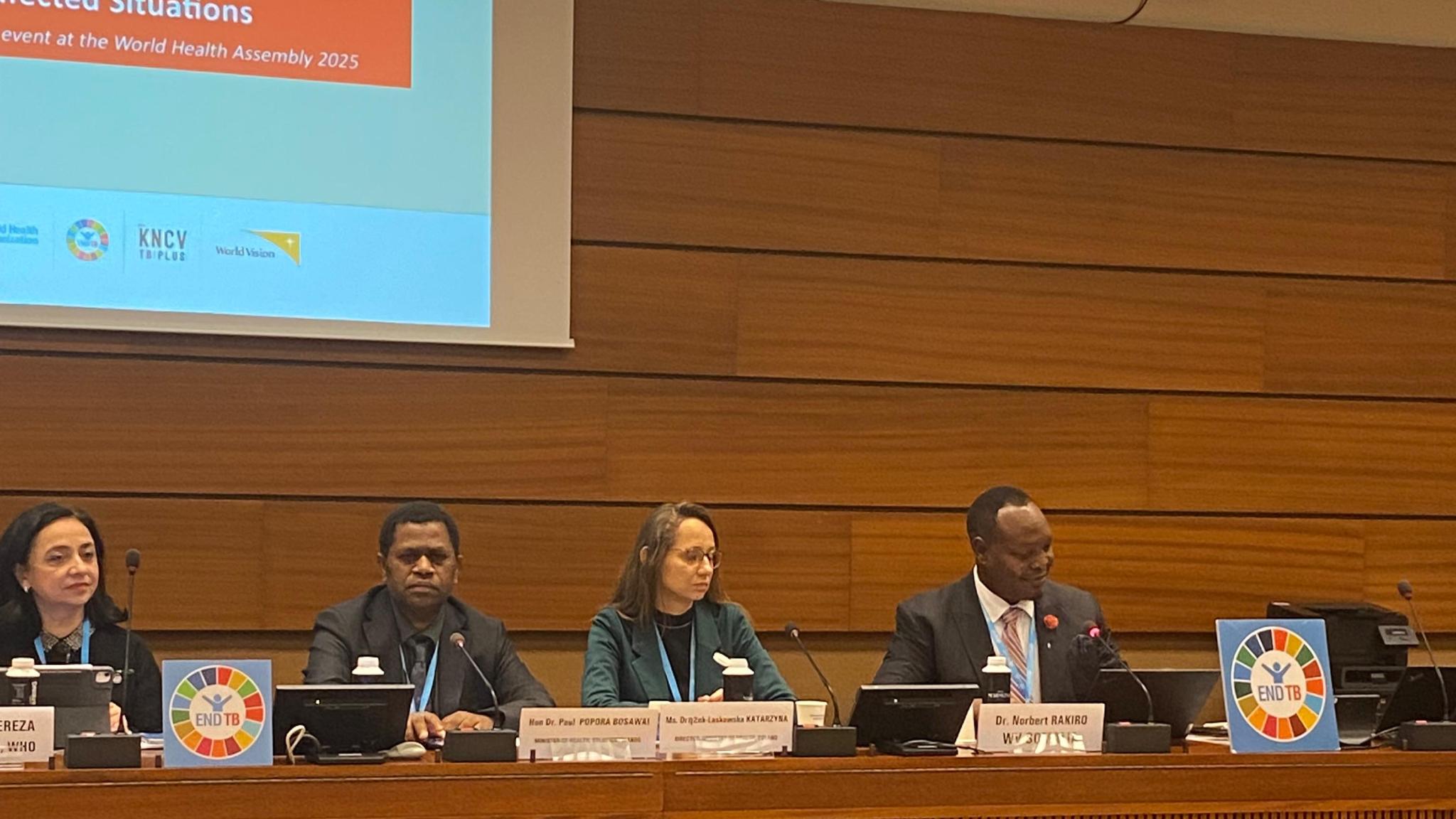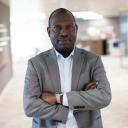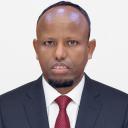"We need to end TB everywhere for everyone"
Tackling TB in fragile settings requires equity, innovation, and community-driven solutions

At the 78th World Health Assembly, global health leaders came together for a powerful side event, “TB in Fragile and Conflict-Affected Situations (FCAS),” underscoring the urgent need to rethink the tuberculosis (TB) response in some of the world’s most vulnerable contexts. As KNCV TB Plus, a leading global organization in the fight against TB, we are reminded that to truly end TB, we must go where the need is greatest, and that means bringing care closer to people living in fragility, displacement, and uncertainty.
The “TB in Fragile and Conflict-Affected Situations” side event took place in Palais des Nations in Geneva on Thursday May 22. The session was co-hosted by the Minister of Health of the Federal Republic of Somalia and the Minister of Health and Medical Services of the Solomon Islands, and co-organized by World Vision International and KNCV TB Plus.
Voices from countries affected by conflict and instability in this meeting highlighted a collective truth: communities are not just recipients of care, they are drivers of solutions and a conduit to access to services in challenging conditions.
As Hon. Dr. Paul Popora Bosawai of the Solomon Islands said with heartfelt words, “We come to you because we need solutions against TB. Our children matter.”
When we think of the number of people who die due to TB in the world, more than 1,25 million per year, it may seem a distant number. Ms. Katarzyna Drążek-Laskowska, Director of International Cooperation Office at the Ministry of Health, Poland, reflected on it and claimed on the urgency of TB deaths: “Imagine that every year a city like Stockholm, Pretoria, Hiroshima disappears. Infectious diseases do not respect borders, we need to do this together, we need solidarity".

Fragile settings demand resilient, person-centred approaches
Fragility not only affects health systems, it impacts trust, access, and community resilience. Dr. Tereza Kasaeva, Director of the Global Programme on TB and Lung Health of the World Health Organization (WHO) noted the global landscape of mass migration and displacement, calling for action: “Every life saved from TB matters."
We are witnessing unprecedented migration of people...We need to rise, we need to act.
Yet, as Dr. Gidado Mustapha, Executive Director of KNCV, powerfully stated, “We are responding to fragility with fragile responses.” his call to action was clear:
- we must deploy digital technology,
- empower trusted local partners, and
- ensure that interventions leave long-term benefits even after programs conclude.
The Global Fund and the power of smart, community-centered investments
The role of the Global Fund to Fight AIDS, Tuberculosis and Malaria (the Global Fund) was acknowledged throughout the session, not just as a financial backer, but as a catalyst for innovation and enabling a strong community response. Dr. Eliud Wandwalo, Head of TB at the Global Fund, emphasized the scale of their support in the global TB response, over 100 countries and more than $1 billion in TB funding. But more than numbers, he highlighted the Global Fund’s identity as a partner, not just a donor, one that is committed to working side by side with countries, communities, and local actors.
Dr. Wandwalo underscored the importance of smart, targeted investments, where he illustrates the critical power of bringing access through community-centred innovations: shorter drug regimens, digital tools for patient support, mobile health clinics and outreach services that meet people where they are. These are not luxuries in FCAS, they are lifelines.
We are called a funder, but we consider ourselves partners.
The Global Fund robustly supports effective health programs in fragile and conflict-affected settings by promoting flexible funding, strong local leadership, and adaptable implementation strategies. Its funding approaches allow for real-time adjustments to timelines and activities as situations on the ground change. Additionally, grants are designed to adapt to local conflict dynamics and governance structures, ensuring that programs are practical and responsive. By working closely with local organizations and partners, the Global Fund also ensures that health programs are locally informed and led, aligned with humanitarian efforts, and remain resilient in the face of crisis.
Local leadership and sustainable partnerships are non-negotiable
Speakers from Papua New Guinea, and the Central African Republic all echoed the same message: sustainable progress comes through strong local ownership and trusted, enduring partnerships. One participant from South Sudan shared during the Q&A session: “Sometimes it’s best for us to partner with local actors, because they will always be there.”
In fragile settings where services are often interrupted and health workers stretched thin, mobile outreach, community-based detection, and patient trust are more critical than ever. Hon. Dr. Pierre Somse of the Central African Republic urged a shift: “We need to move from fixed detection to active detection. People have lost trust in the system, we must go to them.”

“We cannot succeed in isolation. No community should be left behind, left unreachable. No patient left untreated.”





A unified call to action: End TB for Everyone, Everywhere
The session closed with a powerful affirmation from Hon. Dr. Ali Hajji Adam, Minister of Health of Somalia: “We cannot succeed in isolation. No community should be left behind, left unreachable. No patient left untreated.”
In contexts of fragility, equity is not a mere principle, it is a foundational strategy. A person-centered, community-anchored, equity-driven response is our only path forward.
As TB programs adapt to the current global health landscape, let this gathering at WHA78 serve as a reminder: resilient, inclusive health systems are built from the bottom-up, with communities at the center, and partnerships that endure.


